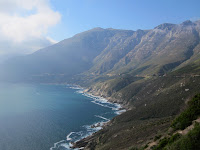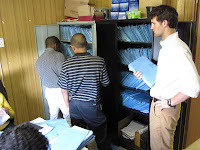3rd day in Khayelitsha sitting in on the training of coaches to do AIDS prevention education.
It was a really tough day in a lot of ways, but it was also an incredible day in terms of what we experienced first hand. Today we were apart of a couple of group discussions (the group of "coaches" consists of 20 young adults from poor, urban backgrounds). In these discussions the topic of sexual practices and condom use were discussed with incredible frankness and honesty. It was certainly the most realistic and open look at the culture in South Africa and the cultural difficulties that underly the AIDS epedemic here. We weren't reading about this stuff from a book or hearing some white, American academic talk about. We were seeing it in real life. We were watching people talk about this stuff and revealing their own personal history and experience. In many ways it was really exciting to be there for these conversations. However the truth that these discussion revealed was deeply disheartening.
The honesty about the prevalence of people having multiple sexual partners was unbelievable. These people mostly come from the Xhsoa ("click"osa) culture which for centuries has practiced polygamy. The president of the country before the current president had multiple wives. Under that culture it is completely common for a man to have multiple (as many as possible) sexual partners, whether married to them or not. That is how men think and that is what even the women expect.
We had a conversation with the head instructors during one of the break and they said that the idea that kids will abstain from sex and wait for a mutually faithful partner/marriage is an absolute "pipe-dream" and isn't a legitimate education stance for an prevention organization that wants to actually make an impact in South Africa. Wow!
On top of that, there was incredible honesty about the infrequency of the use of protection. In the heat of the moment, these people admitted to rarely using protection. For an hour the group went back and forth about why and gave many different reasons. They were telling personal stories and admitting to the frequency of unprottected intercours. Another Wow!
So how do you do prevention?? The two halmarks of prevention (abstainance and protection) seem to be absolutely useless here, if not useless they face a long, uphill road until they actally have an impact on AIDS prevalence and incidence.
We have our own thougths but very few answers.
AIDS is a beast. It is incredible how it strikes at the heart and thrives on these deeply entrenched cultural values. We have mentioned it before but it is so much more than a medical disease. It is a social disease, it is a cultural disease. How do we defeat that?
The typical Amerian solution, that is for the most part true about how our nation is handling this problem in South Africa, is to sit from a distance and throw our money this way and hope for the best and pat ourselves on the back for our noble "altruism," but, as was said today by one of the South Africans, the people of the world who are trying to help need to come and actually see what is happening in South Africa and understand all sides to the HIV/AIDS epidemic problem. More is needed than just a supply of ARV's. These people need role models, and cultural alternatives. How do you change a social norm by throwing money at a culture? It won't happen. There is something deeper at work here than a simple medical disease? We are at a loss for how the epidemic can be stopped with the existing social norms. Something has to change in the minds and culture of this people. How to bring this change about seems beyond anyone at this point in time, but there are multitudes of people here who care and are trying.
Despite all this negativity, we had a great day and learned a ton. We really felt included by the group and we participated in all the activities of the day, and the group listened to our input on the different discussion that took place. We also go to just sit and listen to some really powerful, open discussions that really brought the roots of this HIV epidemic to light.


 This week we are back at GrassRoots Soccer in Khayelitsha. They are training a group of about 20 young adults to present/teach/use their curriculum for HIV/AIDS education and prevention. Interesting in a lot of ways. They do an incredible job of modeling in the training sessions how they want their trainees to teach the kids. Without even knowing almost, the trainees are being taught with the same methods that that are going to use to teach the high school kids (not sure if that makes sense). But you can see how effective a method that is at training these people who have never been teachers to teach in a week. The training works not by telling these guys how they are supposed to teach but by showing them. After they get through this week of training they will have spent 9-5 in the kind of classroom environment that they are supposed to create when they go to schools and communities. Interesting to see in action.
This week we are back at GrassRoots Soccer in Khayelitsha. They are training a group of about 20 young adults to present/teach/use their curriculum for HIV/AIDS education and prevention. Interesting in a lot of ways. They do an incredible job of modeling in the training sessions how they want their trainees to teach the kids. Without even knowing almost, the trainees are being taught with the same methods that that are going to use to teach the high school kids (not sure if that makes sense). But you can see how effective a method that is at training these people who have never been teachers to teach in a week. The training works not by telling these guys how they are supposed to teach but by showing them. After they get through this week of training they will have spent 9-5 in the kind of classroom environment that they are supposed to create when they go to schools and communities. Interesting to see in action.
 Saturday we hiked Table Mountain. Awesome. We aren't hikers and don't have much to compare it to, but it was a decently tough hike. It wasn't that long (2hours) but it was very steep. They had a really well built trail so it was safe but steep.
Saturday we hiked Table Mountain. Awesome. We aren't hikers and don't have much to compare it to, but it was a decently tough hike. It wasn't that long (2hours) but it was very steep. They had a really well built trail so it was safe but steep.
 9) You can see the Indian Ocean and the Atlantic Ocea at the same time. (We drove down to the southern most tip of Africa on our way to Cape Town (Cape Agulhas). This is where these two oceans meet...Awesome. We'll show you pictures when we get back, just ask.
9) You can see the Indian Ocean and the Atlantic Ocea at the same time. (We drove down to the southern most tip of Africa on our way to Cape Town (Cape Agulhas). This is where these two oceans meet...Awesome. We'll show you pictures when we get back, just ask.























